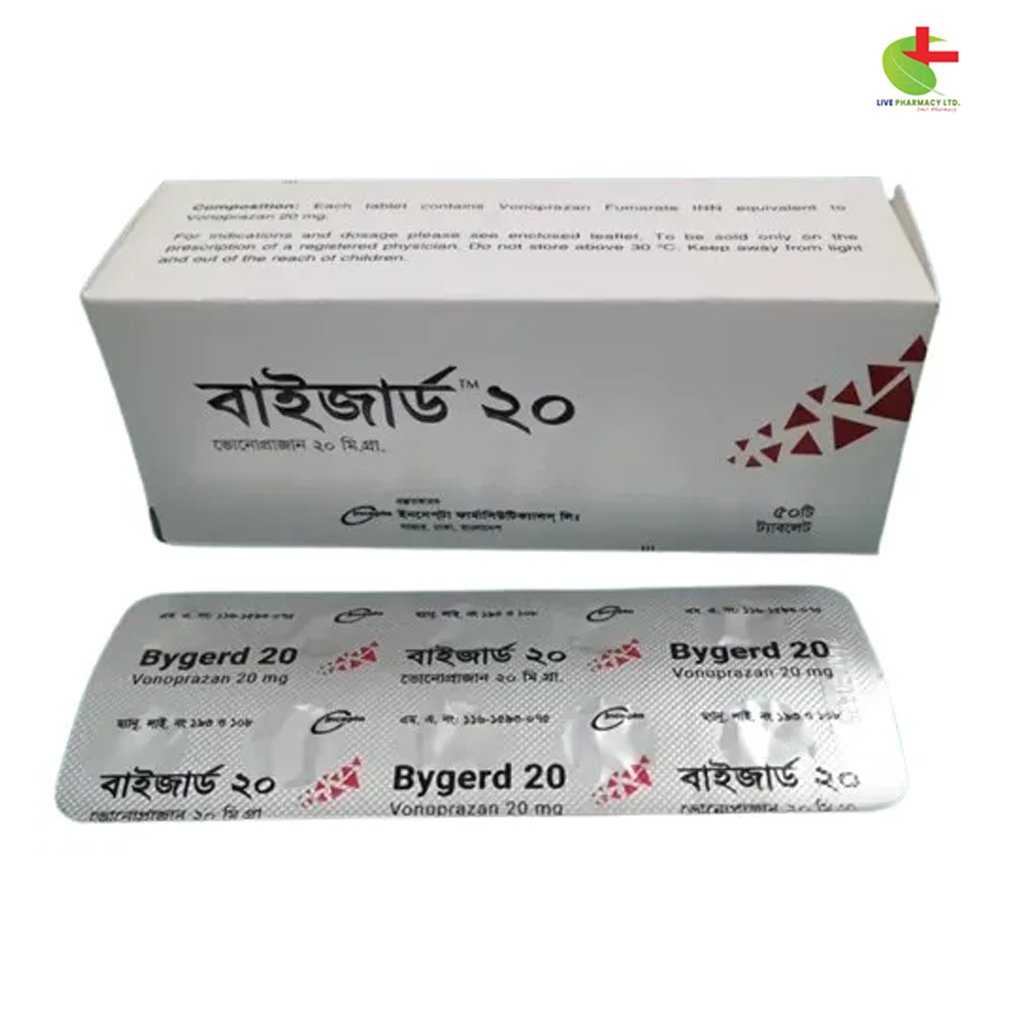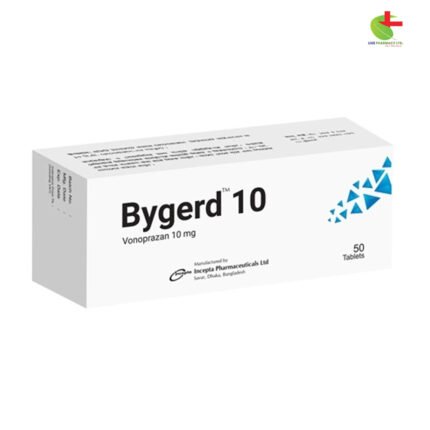Bygerd 20
100.00৳ Strip
- Bygerd (Vonoprazan) is a potassium competitive acid blocker (P-CAB).
- Used to treat gastric and duodenal ulcers, reflux esophagitis, and prevent recurrence of ulcers from NSAIDs or low-dose aspirin.
- Serves as an adjunct in Helicobacter pylori eradication therapy.
- Effectively reduces gastric acid production and promotes healing of the gastrointestinal mucosa.
- Always use Bygerd as prescribed by a healthcare provider.
 Brand
Brand
|
Incepta Pharmaceuticals Ltd |
|---|---|
 Generics
Generics
|
Vonoprazan |
 Type
Type
|
Tablet |
Indications
Bygerd (Vonoprazan) is a potassium competitive acid blocker (P-CAB) indicated for the following conditions:
- Gastric and Duodenal Ulcers: Treatment of gastric and duodenal ulcers, with an 8-week treatment for gastric ulcers and a 6-week treatment for duodenal ulcers.
- Reflux Esophagitis: Treating reflux esophagitis with a recommended 4-week treatment. If necessary, treatment can be extended for up to 8 weeks.
- Prevention of Ulcer Recurrence: Prevents recurrence of gastric or duodenal ulcers caused by low-dose aspirin or NSAIDs.
- Helicobacter pylori Eradication: Used as part of a three-drug regimen (with amoxicillin and clarithromycin or metronidazole) to eradicate Helicobacter pylori in patients with gastric or duodenal ulcers, MALT lymphoma, idiopathic thrombocytopenic purpura, or post-endoscopic resection of early gastric cancer.
Always use Bygerd as prescribed by your registered healthcare provider.
Pharmacology
Bygerd (Vonoprazan) is a potent P-CAB that inhibits H+, K+-ATPase in a reversible, potassium-competitive manner. Unlike proton pump inhibitors (PPIs), Vonoprazan does not require acid activation and effectively suppresses gastric acid production by binding to the parietal cells for extended periods. This helps prevent damage to the upper gastrointestinal tract mucosa.
Dosage
The usual dosage for Bygerd is:
- Gastric Ulcer: 20 mg orally once daily for 8 weeks.
- Duodenal Ulcer: 20 mg orally once daily for 6 weeks.
- Reflux Esophagitis: 20 mg orally once daily for 4 weeks. If needed, extend the treatment up to 8 weeks.
- Maintenance of Reflux Esophagitis: 10 mg daily. Dose may be increased to 20 mg if necessary.
- Ulcer Prevention (Low-dose Aspirin or NSAID): 10 mg orally once daily.
- Helicobacter pylori Eradication: Administer 20 mg of Bygerd, 750 mg amoxicillin, and 200 mg clarithromycin (or 250 mg metronidazole) twice daily for 7 days.
Always consult with your healthcare provider for personalized dosage instructions.
Administration
Bygerd can be taken with or without food. There are no specific requirements regarding the timing of food intake.
Contraindications
Bygerd should not be used in the following cases:
- Hypersensitivity to Vonoprazan or any of its ingredients.
- Patients taking atazanavir, nelfinavir, or rilpivirine hydrochloride.
Side Effects
Common side effects may include:
- Diarrhea, constipation, or nausea
- Drug hypersensitivity (including anaphylaxis), skin rash, urticaria
- Hepatotoxicity, jaundice, or increased liver enzymes (AST, ALT, ALP)
- Abdominal discomfort, edema, and eosinophilia
If any of these side effects occur, contact your healthcare provider immediately.
Pregnancy & Lactation
- Pregnancy: Bygerd should only be used in pregnancy if the benefits outweigh the potential risks to the fetus.
- Breastfeeding: It is advisable to avoid using Bygerd while breastfeeding. If treatment is necessary, consider discontinuing breastfeeding.
Precautions & Warnings
- Long-term Use: Close monitoring, including endoscopy, is recommended for long-term use of Bygerd.
- Maintenance Therapy: Bygerd should only be used for maintenance therapy in patients with recurrent reflux esophagitis.
- Dose Reduction: If healing is maintained, consider reducing the dose to 10 mg daily or discontinuing the medication after evaluating the risk of recurrence.
Use in Special Populations
- Elderly: Caution is recommended when using Bygerd in elderly patients due to potential decreases in hepatic or renal function.
- Children: Safety and efficacy in patients under 18 years of age have not been established. Therefore, Bygerd is not recommended for use in pediatric patients.
- Renal Impairment: No dose adjustment is required for mild to moderate renal impairment. Avoid using Bygerd in patients with severe renal impairment (eGFR < 30 mL/min).
- Hepatic Impairment: No dose adjustment is required for mild hepatic impairment. Avoid using Bygerd in moderate or severe hepatic impairment (Child-Pugh B or C).
Overdose Effects
No specific antidote for Bygerd exists. In the case of overdose, symptomatic and supportive treatment should be administered. Bygerd is not removed from circulation by hemodialysis.
Therapeutic Class
- Potassium Competitive Acid Blockers (P-CAB)
Storage Conditions
Store Bygerd below 30°C in a cool, dry place, away from direct light. Keep it out of reach of children.













Reviews
There are no reviews yet.